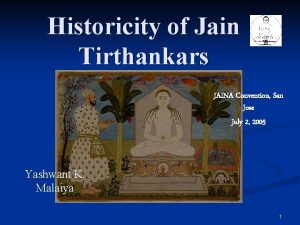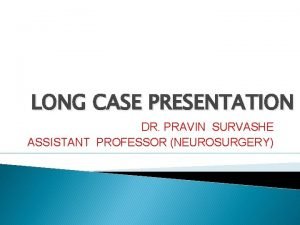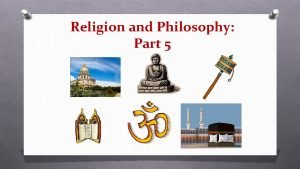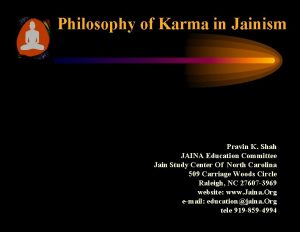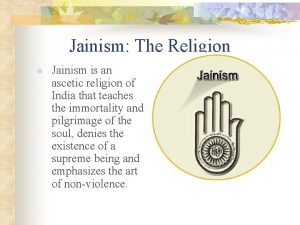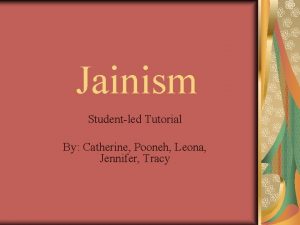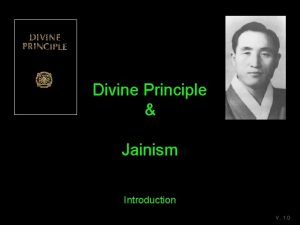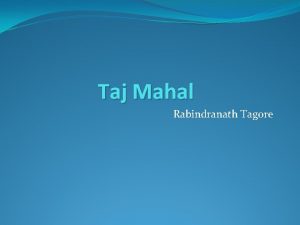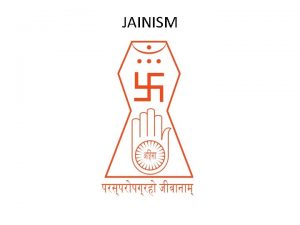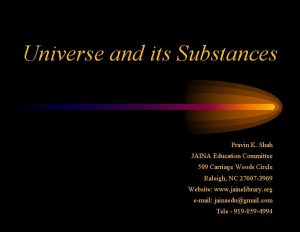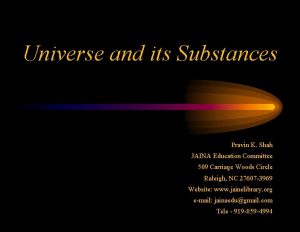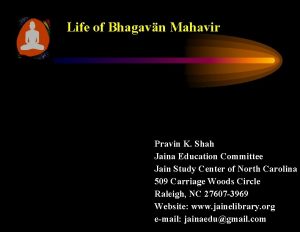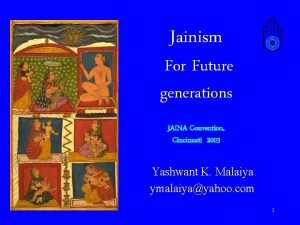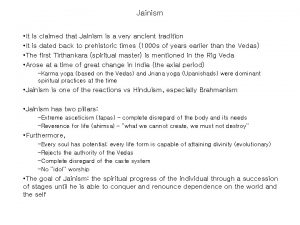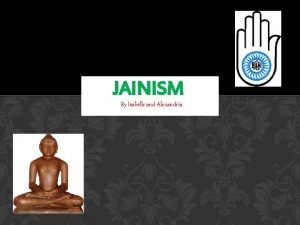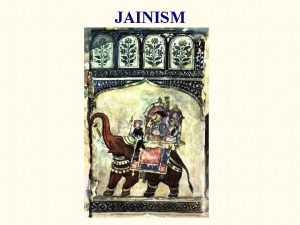Fundamentals of Jainism Pravin K Shah JAINA Education




















- Slides: 20

Fundamentals of Jainism Pravin K. Shah JAINA Education Committee Jain Study Center of North Carolina 509 Carriage Woods Circle Cary, NC 27513 -6469 Website: www. jaine. Library. org e-mail: jainaedu@gmail. com Tele - 919 -859 -4994 1

Lord Mahavir’s Preaching Style You are God (Ishvara). Recognize yourself. Develop the inner divine qualities and become God. If any soul puts effort in the right direction, then that soul can become God (paramaatma). 2

Lord Mahavir’s Preaching Style His ideas were Novel His attitude was Progressive He never tried to coerce others to follow Jain doctrine and principles He never used force, fears, greed, threats, etc. to pursue his ideas 3

Lord Mahavir’s Preaching Style Conquer anger by forgiveness, Pride by humility Deceit by Straight-forwardness Greed by Contentment 4

Lord Mahavir’s Preaching Style External renunciation is meaningless if the Soul remains fettered by internal shackles (Kashaya or vices) Bhava-Pahud (13) 5

Lord Mahavir’s Preaching Style “I do not favor Mahavir, nor am I prejudiced against Kapil. I would accept anyone’s statement provided I find it true on the scale of logic” Acharya Haribhadra in Lokatva Nirnaya 6

Lord Mahavir’s Preaching Style Advocates of Jain religion often suffer from dogmatism. They may agree that what they have known is not absolute truth But They insist that what others believe is absolutely wrong Acharya Mahapragnaji 7

Lord Mahavir’s Preaching Style Whatever I say, you must test this with your own reasoning and verify it through your own experience. Do not accept what I say blindly by faith alone until it passes the litmus test of intellection. Otherwise, it will never be yours. If you accept what I teach on the basis of the sacred texts, or from my convincing reasoning, or even because of my radiant personality, but not by testing with your own reasoning, then in the end this will create only darkness (ignorance) in you and not light. Tirthankar Mahavir Ref Book - Harmony-Of-All-Religions by Maharshi Santsevi Maharaj (Page 100) 8





Jain Fundamental Beliefs Ø Universe is without a beginning or an end, and is everlasting and eternal. No one has created it and no one can destroy it. Ø Six fundamental substances or entities known as Dravya constitute the universe; Soul (Jiva), Matter (Pudgal), Principle of Motion (Dharma), Principle of Rest (Adharma), Space (Äkäsha), and Time (Käl). Ø All six entities are eternal. Although they undergo countless changes continuously, they do not transform from one substance to another and retain their inherent qualities. Ø Soul is the only living substance, which is consciousness. Every living being is a soul. An infinite number of souls exist in the universe and they are all unique individuals. The remaining 5 substances are non-living beings (Ajiva). 13

Jain Fundamental Beliefs Ø Karma is one of the category of Matter (Pudgal). Hence it exist from Eternity. Ø Soul is in Mithyätva (Delusion or ignorance and wrong belief) from Eternity Ø Karma is attached to the Soul from Eternity Ø Our Mithyätva (Delusion or Illusion), Kashäya (vices) and the intention behind our actions of body, mind, and speech continue to bind us with new Karma. Ø Principle governing the successions of life cycles (Birth, Life, and Death) is Karma. Ø Ultimate goal of life is Liberation from suffering (Mithyätva and Kashäya - Vices) through understanding and realization of its pure nature (which in turn eliminates Kashaya and removes all 14 Karma).

Jain Fundamental Beliefs Mithyätva or Delusion means: • One does not know the Truth but one firmly believes the Untruth is Truth • Belief is held with absolute conviction • Belief is not changeable even by compelling counterargument or proof to the contrary Kashäya means: • Anger, Ego, Deceit, Greed, Attachment, Aversion and other vices Mithyätva (not Karma) is the root cause of all Sufferings 15

Aim of Jainism To realize the original attributes of a Soul by removing Mithyätva and Kashäya and there by Freeing it from its bondage to Karma. Questions: § What is Soul and its original Attributes? § What is Mithyätva, Kashäya, and Karma? § What are their Attribute or Qualities? § What is Bondage? § What is Freedom? § How is the Soul bounded by Karma? § How can one obtain a state of total freedom or pure consciousness? Answers require the proper knowledge of the Universe and its substances and their relationship with each other.

Jain Religion Definition Absolute Point of View: The True Nature of a substance is the Religion of a substance Practical Point of View: Any activity of Body, Mind and Speech which reduces/removes Mithyätva and Kashäya (Anger, Ego, Deceit, and Greed) is known as Religion 17

Morality vs. Spirituality Individual Person Following Not Following Law and Order Moral Spiritual Immoral Non-spiritual

Morality vs. Religion §Jain Morality (Vyavahär Dharma) • Conduct in accordance with the guide lines prescribed by Arihantas / Tirthankars • Our conduct must accompanied by compassion, friendship, love, sympathy, equanimity etc. otherwise it is merely mechanical action §Jain Religion (Nishchaya Dharma) • Purity of Soul by Removal/elimination of Mithyätva and Kashäya 19

Jain Religious Literature §It consists of: ØScriptures, Commentary on Scriptures, and Independent works consist many aspects of Religion §It describes and reflects upon: 1. 2. 3. 4. 5. History of the society Ritual aspect of the society Cultural aspect of the society Morality of an individual and the society Spirituality of an individual
 14 rajlok
14 rajlok Jaina convention
Jaina convention Pravin kolhe
Pravin kolhe Dr pravin survashe
Dr pravin survashe Jain agam literature
Jain agam literature Pravin chaturvedi
Pravin chaturvedi Pravin kolhe
Pravin kolhe Jainism beliefs
Jainism beliefs Jainism knowledge
Jainism knowledge Hindusim hearth
Hindusim hearth Raga mana klesha asrava
Raga mana klesha asrava Importance of jainism
Importance of jainism Leona jennifer
Leona jennifer What is jainism
What is jainism 14 rajlok in gujarati
14 rajlok in gujarati Jainism
Jainism Jain way of life
Jain way of life Jainism diet
Jainism diet Sects of jainism
Sects of jainism N.a. chauhan v. n.k. shah
N.a. chauhan v. n.k. shah Though emeralds rubies pearls are all
Though emeralds rubies pearls are all

